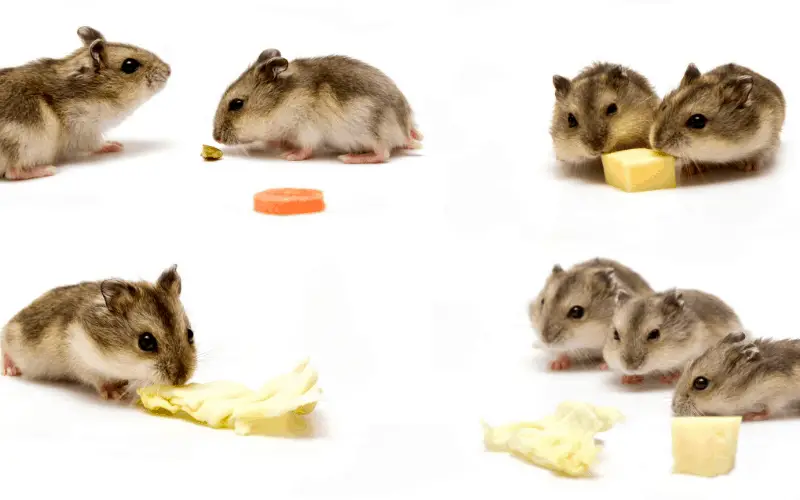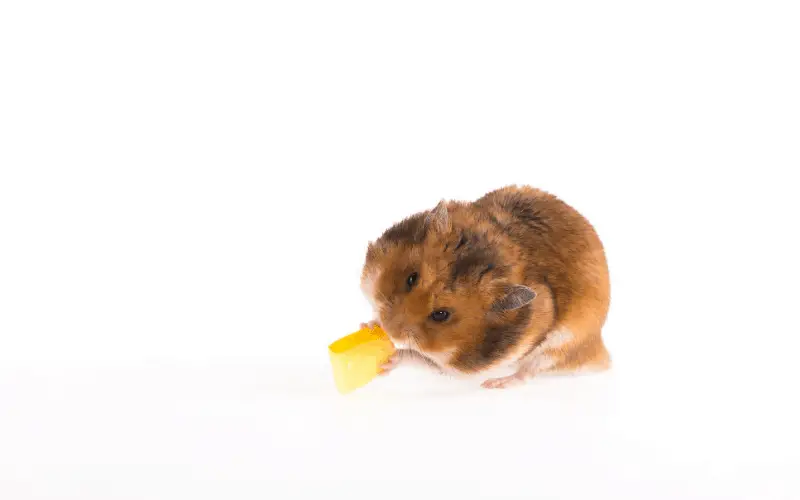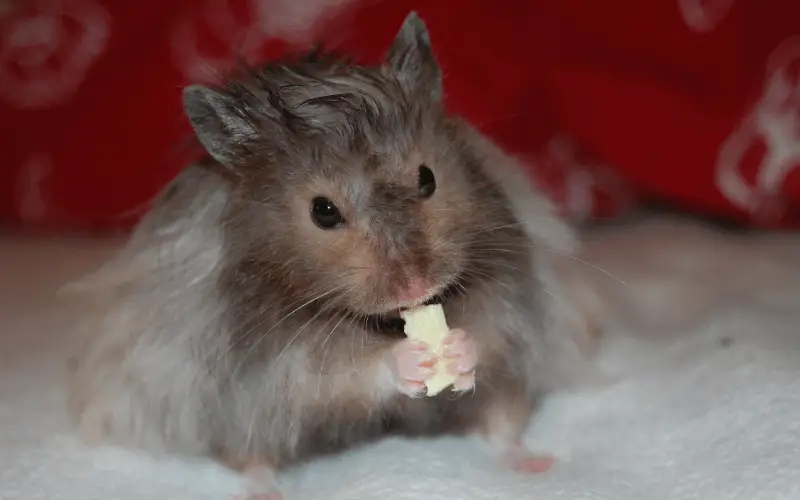Most foods will rather take away from your hamster’s health more than they can give him.
But what about cheese? Can hamsters eat cheese? Yes, hamsters can eat cheese, when served in a tiny portion. However, serve your hamster’s Cheese made from the milk of 100% grass-fed animals because it’s highly nutritious.
Cheese is a great source of minerals, calcium, fat, and protein. It has vitamins A and B-12, including zinc, phosphorus, and riboflavin. As such it’s good for hamsters.
In this post, we will share the health benefits of cheese to hamsters, health risks of cheese to hamsters, what cheese are good for your hamster, and lots more.
Alright. Let’s take a deep dive.
Can Hamsters Eat Cheese?

Yes, hamsters can eat cheese, though not all cheese is safe for them. They are those that can be toxic.
Cheese that has low-salt content is healthy for hamsters. Such cheese is cottage cheese, ricotta, mozzarella, etc.
However, they should be fed with moderation. Only a finger-nail size is recommended once a week.
Since cheese is high in fat and quite caloric, the amount to be given to hamsters should be tiny, no matter the hamster’s size.
So, don’t make cheese a regular diet for your hamster. Failing to adhere to this instruction will put your hamster at the risk of obesity.
Further, make sure your hamster likes cheese first before introducing it to his diet. Take out a test on him first and confirm if his body system accepts the snack.
You will be saving him a lot of health issues.
Read Also: Is Cheese Good for Dwarf Hamsters?
Is Cheese Good For Hamsters?
To know if cheese is good for hamsters, we will first consider cheese’s health benefits.
If cheese is given to hamsters as an occasional treat, it is alright. But there is a danger if it becomes their regular diet.
Watch out for those cheese that is salty. Such are parmesan, asiago, and American cheese. American cheese is processed with a lot of sodium.
It is better and healthier to give your hamster such cheese that is loaded with protein and calcium. Yet, you must serve it in minimal quantity.
Cottage cheese has enough protein and calcium that will help maintain your hamster’s bones’ good health.
Cottage cheese is also good for any pregnant or nursing hamster. Young and growing hamsters under 6 months would appreciate a serving of cottage cheese once a week.
Mozzarella is another great cheese to serve your hamster. It is so low in fat.
Is Cheese Harmful For Hamsters?
Can what is good also be bad? You may wonder along with me and be moved to ask, is cheese bad for hamsters?
The truth is that cheese has its own health risks. It is bad when it is served in excess.
A high in sodium diet can spiral the blood pressure of hamsters and make them vulnerable to heart attack and stroke. It can also raise the risk of kidney disease in them.
If hamsters’ diet is too high, their blood cholesterol is likely to rise. It is also another cause of stroke and heart attack.
Cheese can block hamsters up and make them find it difficult to pass stool freely. That’s why a regular feeding of cheese, and in great quantity to hamsters, is discouraged.
How Often Should I Feed My Hamster Cheese?

We have seen that cottage and mozzarella cheese are healthy for hamsters in small quantities. It is now pertinent to know how often you should feed your hamster cheese.
Hamsters store food in special pouches in their cheeks so they can eat it later.
So, if you give your hamster more cheese than he should take, he will store the rest away in his cheeks.
You know already that the stored food in his cheeks may go bad before he gets the chance to eat it.
It’s very okay to feed your hamster cheese just once a week. However, make sure the cheese is mild and low in fat and salt.
Keep the quantity given very low — a teaspoon is better.
What Kind Of Cheese Can Hamsters Eat?
As we have already seen, only cheese that is mild and low in fat is healthy for hamsters.
Now, what are such cheese?
Cottage Cheese: This packs very little fat, and a good amount of that fat is unsaturated. There are no added sugars. Although, there is a healthy dose of protein, with 11g being part of just one (human) serving able to keep your hamsters healthy.
Mozzarella: This features a sweet, light flavor and pleasing texture. One 9g contains fat when you serve a (human) and only 4.5 of those come from saturated fat. More so, it is easy and soft to cut into small pieces as your hamsters feed.
Ricotta: This is low fat, soft cheese when you make it with whole milk, it contains 4 g of fat, and 2.7 of those come from saturated fat. A Ricotta of one human-sized contains only 100 calories and gets you 3g of protein. You can serve Ricotta with a single, small berry to give your hamster a special dessert.
Provolone: This cheese has 12g of fat per adult human serving, and 7.5 of those come from saturated fat. Provolone is sold in slices, and it’s easier to peel off tiny pieces and give them to your hamster, it’s really an easy treat. Finally, provolone cheese contains more flavor, which is why your hamster loves it.
Conclusion
Cheese is a great treat your hamster can be thankful for, only if it is served in a small amount and once a week.
You can serve your hamsters a little portion of cheese as an occasional treat to prevent health problems.
The truth is, the saturated fats, alongside the cholesterol in cheese, can lead to constipation. Be it as it may cheese is low in fiber, and eating too much of it will harm your hamster’s bowel movements and health in general.
Cheese contains lots of saturated fats. More so, it’s highly processed and refined food, so we recommend feeding your hamsters cheese made from the milk of 100 percent grass-fed animals.
As feeding your hamsters, salty food may lead to dehydration while consuming too many calories may lead to obesity, so be careful not to serve your hamsters what will endanger their health.

